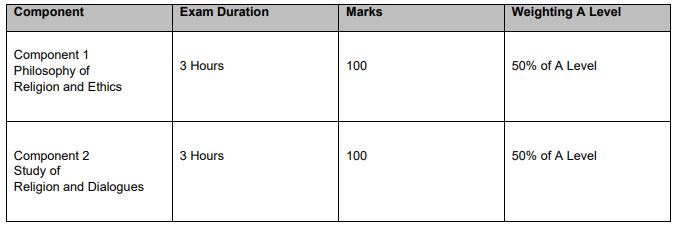A Level Religious Studies (Philosophy & Ethics)
Aimed At:
Anyone who wishes to consider sciences, medicine, social work, the police force, economics, business etc. beyond the school. It is also aimed at those who have an interest in matters spiritual and moral or who wish to win arguments by reasoning. There is no requirement of belief or religious faith of any kind.
A Level
At A Level, students are expected to understand the concepts of R.E deeper and will feel confident in critically analysing and debating religious issues.
Component One: Philosophy of religion and ethics
Section A: Philosophy of religion
- Arguments for the existence of God
- Evil and suffering
- Religious experience
- Religious language
- Miracles
- Self and life after death.
Section B: Ethics and religion
- Ethical theories
- Issues of human life and death
- Issues of animal life and death
- Introduction to meta ethics
- Free will and moral responsibility
- Conscience
- Bentham and Kant.
Component 2: Study of religion and dialogues
Section A: Study of religion – the following topics are covered:
- Sources of wisdom and authority
- God/gods/ultimate reality
- Self, death and the afterlife
- Good conduct and key moral principles
- Expression of religious identity
- Religion, gender and sexuality
- Religion and science
- Religion and secularisation
- Religion and religious pluralism.
Section B: The dialogue between philosophy of religion and religion.
- How religion is influenced by, and has an influence on philosophy of religion in relation to the issues studied.
Section C: The dialogue between ethical studies and religion.
- How religion is influenced by, and has an influence on ethical studies in relation to the issues studied.
The textbook which is used at A Level is: Textbooks: Religious Studies for A- Level Year 1, Religious Studies for A-Level Year 2 published by Hodder Education
Assessment Information A Level:
There is no coursework in this subject but there are two examinations in the agreed times.
The examinations will contain structured questions and be demanding. You will be expected to show argumentative skills as well as the capacity to demonstrate and manipulate knowledge.










